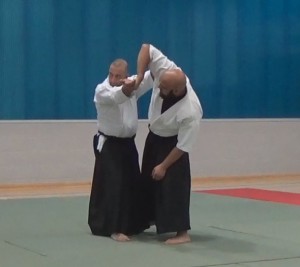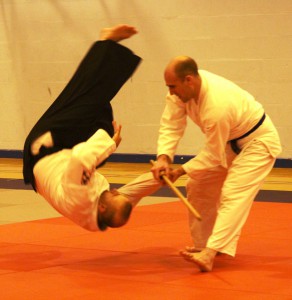The mind gives up before the body By Qaisar Najib
 Training the mind is as important as training the body; this dawned to me some time ago as a friend and I were walking through an area of Birmingham. It was a lovely summer day and as we don’t get many of these type of days people always use the opportunity to go out with families and friends to make the most of the limited sunshine we do get here in the UK. As we walked up the street ahead of us were a group of young men, who seemed excited by the sunshine and atmosphere of the day. They were loud, boisterous and very sure of themselves.
Training the mind is as important as training the body; this dawned to me some time ago as a friend and I were walking through an area of Birmingham. It was a lovely summer day and as we don’t get many of these type of days people always use the opportunity to go out with families and friends to make the most of the limited sunshine we do get here in the UK. As we walked up the street ahead of us were a group of young men, who seemed excited by the sunshine and atmosphere of the day. They were loud, boisterous and very sure of themselves.
As my friend and I noticed them the atmosphere changed, maybe looking back they didn’t seem as nefarious as they did at the time. We were young and immature; stereotypes may have played a role in our view of the young people in our way. They looked bored and maybe wanted to have some fun at our expense.
My friend and I had been practising various martial arts for some time and he had been practising far longer than I. He was far better than I and I would consider him one of my teachers. A strange thing then happened which made me think and reconsider my view of training (and now teaching).
My friend held my arm as a child would when threatened by something and placed himself slightly behind me. It was a subtle gesture but I think I understood. It was a call for help, a call to say “this isn’t in my comfort zone and I need assistance”. Adrenaline can be confused for fear on many occasions and our fight or flight responses may manifest in many ways, but it seemed clear to me at the time – “please take charge”.
We carried on walking towards the group of people and they didn’t seem to want to get out of the way, standing confident as if to goad us into a reaction. It was a notorious area for trouble but most of it caused by boredom possibly or a sense of belonging to something which they felt was bigger than them, the collective.
As we came close to them it did seem like they wanted trouble staying in our path and now the shoulder were square to us staring and you could see their minds asking themselves a million questions. Calculating whether to stand down or act. I smiled at one that seemed to be the leader of the pack (Something I had learned from my brother) and said in my most confident voice “excuse me ladies”.
It was a calculation on my part; I didn’t want to have to physically protect myself. Most likely my friend and I would have come out far worse. I didn’t want that at all.
It worked they came out of the way and we walked right on to where we were going. Sometimes a show of madness is enough, everybody is afraid of a psycho.
When the adrenaline calmed down we talked about the incident and concluded the mind and body both need to be worked on.
One can train the body to do the most amazing things but if the mind gives up there is nothing the body can do.
How to train the mind?
 Always push yourself that little further than you think you can.
Always push yourself that little further than you think you can.
In my Muay Thai training it wasn’t uncommon to puke up. This was seen as something to be proud of. It meant you pushed your body, trained that much harder than before and your body fought back. You felt nauseous, went to the bathroom puked up, rinsed your mouth out and came back for some more.
It does seem these days that we have lost this in our aikido training and some of my students will tell you that our training sessions and our drill work can leave you thoroughly worn out. The look on their faces when I start counting in halves on their sets when they have already given me what they thought was their limit. I want to push them to be the best they can be, and that means pushing the boundaries. This works though, the next week they give me more, now that their minds know that they are capable of doing it.
Get out of your comfort zone and do challenging things.
In all dojos there are always groupings of people that like to train with each other. They become friends feed off of each other. Although this is good, sometimes it is good to break these routines. I put people together that I know will find it hard to train and apply techniques on each other. This is sometimes controlled at first and I let them fail a few times until I see a little frustration on their faces and their minds starts to wonder about the technique and it’s applicability or the way they have been practising it. I then intervene and demonstrate and tell uke to be a good uke and not always let me get away with the cracks in my technique. I demonstrate and then they do, and I try to be patient as not everyone gets it the first time. This nurturing also I find helps their minds when they actually achieve what they thought was previously impossible. I am always very happy at the ecstatic look that comes on their faces.
Nurture, don’t destroy.
Some instructors take great pleasure from putting down students. It is expected by them that the students put the instructor on a pedestal. An ego stroked environment causes submissiveness and creates drones that hinder thinking. These instructors destroy or exclude any person that can think for themselves and even stop them from training in other dojos.
I feel as an instructor, I should never shout at the students, for it not a privilege for the student that I am teaching them. It is a privilege for me that the students have given up their time to learn from me. An instructor must be patient and wise when dealing with students so as to not demean them in any way. Respect is earned and if the instructor is worthy respect will come naturally.
This is from my observations of students and classes I have attended and taught at. I have made many mistakes in my time as an instructor and as a student. I hope I have learned from those mistakes.
By keeping in the forefront that we train the mind also we can develop the mind that doesn’t give up at the first hurdle; a mind that is even equipped for failure sometimes and learns from those mistakes, a mind that is disciplined.
Train well train hard.

